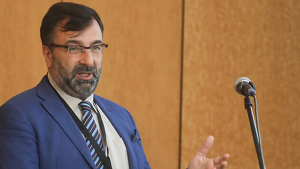Een Europese alliantie voor de circulariteit van composietmaterialen
21 maart 2023
Begin maart van dit jaar interviewde JEC Composites Magazine Roberto Frassine, voorzitter van EuCIA, de European Composites Industry Association, over de duurzaamheid en circulariteit van de composietenindustrie.
Professor Roberto Frassine is al dertig jaar een expert in de visco-elastische eigenschappen van polymeren en composieten, met meer dan 70 technische en wetenschappelijke internationale publicaties. Hij is voorzitter van Assocompositi, de Italiaanse branchevereniging voor composieten, en voorzitter van UNIPLAST, de Italiaanse nationale normorganisatie voor kunststoffen en composieten. Hij is tevens is hoogleraar Polymere en Composietmaterialen aan de afdeling Industriële Chemie en Chemische Technologie van de Politecnico di Milano.

Lees hieronder het volledige interview (Engelstalig) met Roberto Frassine.
JEC Composites Magazine: From your perspective, what are the current trends within the composites industry?
Roberto Frassine: Composite materials maintain a high potential for growth, especially in energy, construction and transportation applications. The wind energy sector is expected to grow significantly and a good potential can also be foreseen for lightweight hydrogen tanks. The construction industry is expected to develop due to the upcoming introduction of a new standard for composite construction in the Eurocodes. Sustainability and circularity issues are the next “big thing” – EuCIA is working actively to prepare for the discussion and a new position paper is available on our website.
JEC Composites Magazine: What’s EuCIA position about the topic of composite materials recycling?
Roberto Frassine: Our Sustainability Committee has been engaged in defining the industry’s position on boundary conditions on this topic. With our position paper, we successfully demonstrated that not only are composites recyclable, but also that the recycling techniques available are very effective, we want to follow up on the proposal for a cross-industry circular composites alliance, so that the potential of our materials can be realized at the industrial scale.
We think composite materials can perform the best because of their versatility, durability and resistance to environmental stresses. It will soon be crucial to develop guidelines with circular economy schemes (design for circularity).
EuCIA would support the creation of an alliance with all stakeholders of the composites industry. We are already discussing with Wind Europe and EBI together with EuCIA members to develop a proposal document stating the objectives, which will be followed by a call to invite stakeholders to participate. As a result, we confirm that cement co-processing is today an effective solution, and we are closely working with CemBureau to develop this recycling route.
JEC Composites Magazine: The anticipated EU roadmap for end-of-life recreational boats will soon be launched by the European Commission and the European Boating Industry. What can you tell us about this?
Roberto Frassine: The strategy promoted by EBI – which has a time horizon to 2025 – is encapsulated in the mission statement “Advancing and representing a sustainable boating and nautical tourism industry #MadeInEurope”.
In 2020, the European Commission confirmed to EBI that measures to reduce greenhouse gas emissions from recreational boats will be included in the review of the Recreational Craft Directive (RCD) as a direct consequence of the European Green Deal, which has the target of making the EU carbon-neutral by 2050. Since then, EBI and the European Commission Directorate-General for Maritime Affairs (DG MARE) have been jointly leading a working group on end-of-life boats. The aim of this collaboration is to develop an EU roadmap that EU countries can follow to set up their own dismantling systems. We are currently involved in this initiative together with the European Boating Association (EBA), the International Council of Marine Industry Associations (ICOMIA) and other associations representing composite end-users.
We mention the French initiative, approved by the ministry of ecological transition, called APER, composed of boat builders. It is a unique organization that has been showcased as a good example by the EU Commission’ DG MARE.
JEC Composites Magazine: Can you give us other examples of projects EuCIA is currently working on?
Roberto Frassine: EuCIA’s mission consists in supporting the sustainable growth of the composites industry and promoting the development of a flourishing business environment, taking advantage of the combined expertise of its members.
We are active in various fields:
Innovation in composites applications, with the MaxBlade Horizon Europe project to develop the world’s largest tidal turbine blades.
Innovation in end-of-life composite materials, with the Refresh Horizon Europe project, aimed at recycling composites wind blades.
Sharing best practices: we are part of the Global Composites Sustainability Coalition (GCSC).
Promoting standardization: the July 2022 the EN/TS 19101 “Prospect for new guidance in the design of FRP” was recently approved by 23 member states of CEN. This document, developed by CEN/TC250/WG4, has received the full support of EuCIA, both technically and financially.
JEC Composites Magazine: What are the toughest challenges the composites industry is facing in implementing/adopting new sustainable technologies?
Roberto Frassine: We believe that the transition will be smooth. In this regard, we are organizing together with JEC, during JEC World a conference entitled “Less is better: reducing waste, costs, energy & time for sustainable composites manufacturing“, to which we invite all readers of this article. This session will provide a good overview of the challenges but also opportunities our industry is facing in the near future.
Website: www.eucia.eu
Website: www.jeccomposites.com
Op de hoogte blijven?
Meld je aan voor de nieuwsbrief en blijf geïnformeerd over wat er speelt in en rondom de composietsector.